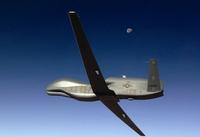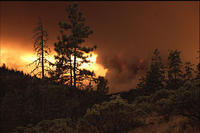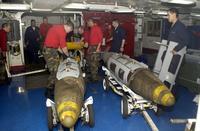-
Marines test latest battlefield IT at Agile Bloodhound ‘13
Marines in Hawaii last week demonstrated that using handheld devices and special software automatically to sift through loads of data can help ease information overload and deliver made-to-order intelligence to the front lines. “We’re trying to create a user-oriented world view for Marines,” said Col. William Zamagni. “Whether they’re in command centers with PCs, in vehicles with laptops or on foot with smartphones, Marines need access to the most pertinent information possible.”
-
-
NSA surveillance leads to San Diego conviction of al-Shabaab supporters
Three Somali men residing in San Diego were sentenced to prison on Monday for aiding al-Shabaab, a Somali terrorist organization. The sentencing hearing in a San Diego federal court came four days after the men lost their bid for a new trial, requested after discovering that the charges were supported by evidence from theNational Security Agency’s (NSA) surveillance program.U.S. District Judge Jeffrey Miller denied the defense’s request to dismiss the NSA surveillance-generated evidence, saying the collection of the evidence did not amount to a warrantless search, and that while the agency’s surveillance programs were controversial, the protocol that was followed aligns with the law.
-
-
Fashion scouts and cops: the logic behind stop-and-frisk
New research compares practices used by fashion industry casting directors to the New York City Police Department’s controversial stop-and-frisk program. Fashion casting directors belong to a select group of mediators responsible for shaping the pool of modeling talent by scouring familiar territory for the young and beautiful. These casting directors had been similarly indoctrinated into the industry and the talent they would choose often resulted in over-representation of certain kinds of people. Similarly, police officers are a select group responsible for making a city safer. Their training — reinforced daily through the institutionalization and public acceptance of such practices — disposes them to scour familiar geographical and social territory for potential criminals, often resulting in over-representation of people from certain groups.
-
-
France to offer counter-terrorism support to Libya
French Foreign Minister Laurent Fabius has confirmed that France is considering providing Libya additional aid in counter-terrorism and police training. Since the NATO-supported revolt removed Muammar Gaddafi from office two years ago, Libya has not had an effective central government, and the country has turned into a battleground for rival militias and al Qaeda-linked militants.
-
-
Security agencies concerned about plastic guns
The Undetectable firearms Act of 1988, which makes it illegal to manufacture, import, sell, ship, deliver, process, transfer, or receive a firearm which is not detectable by walk-through metal detection, is set to expire on 9 December 2013. If Congress fails to reauthorize the law, plastic guns will no longer require metal components which are detectable by metal detectors. “When these 3D firearms are manufactured, some of the weapons can defeat normal detection such as metal detectors, wands, and it could present a problem to public safety in a venue such as an airport, an arena, a courthouse,” says ATF assistant director Richard Marianos.
-
-
Sticks over carrots: the rationale of Assad’s counterinsurgency “madness”

Counterinsurgency (COIN) efforts by the West, particularly over the past decade, have emphasized the limitation of violence and the importance of the local population. Western COIN practice focuses on establishing the perception of state legitimacy in the area around which the insurgency is taking place. The objective is to sway influence away from the insurgents and towards the regime by providing security, services, stability and growth. By contrast, Syrian efforts in counterinsurgency have not only avoided securing the civilian population, but have actively targeted it. Whereas Western COIN prioritizes “the people,” the Syrian strategy focuses on the elimination of the militant opposition regardless of the collateral violence. Assad’s “enemy-centric” approaches to counterinsurgency utilizes intense violence — targeting of refugees, schools, hospitals, and using chemical weapons — to divide public support from the insurgency by punishing the civil population.
-
-
Local enforcement of immigration law does not achieve intended goals
A new study found that when local law enforcement agencies begin to inquire immigrants about their immigration status, some immigrants relocate within the United States but few go back relocate to their home country. Those who move to other states tend to be educated – and legally in the United States. The only exception is Arizona’s Maricopa County — which made a name for itself owing to Sheriff Joe Arpaio’s controversial approach to immigration policies — where immigrants are likely to leave the country, perhaps due to unusually intense enforcement and a short distance to the border.
-
-
New drone to monitor radiation following nuclear disasters

Researchers have unveiled a large semi-autonomous drone called the ARM system which could be used to provide visual and thermal monitoring of radiation after a release of nuclear material. The system was developed in response to requirements for radiation monitoring in event of the release of radioactive materials.
-
-
Forecasting long-lived wildfires

Scientists have developed a new computer modeling technique that offers the promise, for the first time, of producing continually updated daylong predictions of wildfire growth throughout the lifetime of long-lived blazes. The technique combines cutting-edge simulations portraying the interaction of weather and fire behavior with newly available satellite observations of active wildfires.
-
-
Ohio lawmakers want to limit use of drones by law enforcement
State lawmakers in Ohio want to limit the use of drones by law enforcement agencies in the state.A proposed bill would require law enforcement to obtain a search warrant before using drones. It would prohibit law enforcement from using drones to search for missing persons, locate illegal marijuana operations, or perform several actions officers currently handle with helicopter surveillance.
-
-
Wrong crowd: social networks are key to city violence
A new study of gun violence in Chicago reveals that a person’s social network is a key predictor in whether an individual will become a victim of gun homicide, even more so than race, age, gender, poverty, or gang affiliation. “Risk factors like race and poverty are not the predictors they have been assumed to be,” one of the researchers said. “It’s who you hang out with that gets you into trouble. It’s tragic, but not random.”
-
-
Rochester, Minn. wants to stop crime before it happens
The Rochester Police Departmentin Rochester, Minnesota is using IBM’s Infosphere Identity Insightto predict, and combat, crime. InfoSphere Identity Insight is used to identify frequent crime offenders, and even when multiple false identifications belonging to one individual are stored on record, the associated relationships of those identities could lead to the correct individual.
-
-
U.S. intelligence community seeking better face recognition biometrics
Intelligence analysts often rely on facial images to assist in establishing the identity of an individual, but too often, just examining the sheer volume of possibly relevant images and videos can be daunting. While biometric tools like automated face recognition could assist analysts in this task, current tools perform best on the well-posed, frontal facial photos taken for identification purposes. The Intelligence Advanced Research Projects Activity (IARPA), the research arm of the U.S. intelligence community, is seeking significantly to improve the current performance of face recognition tools by fusing the rich spatial, temporal, and contextual information available from the multiple views captured by today’s media.
-
-
The Ergonomics of bomb-making at sea

In an effort to stem work-related injuries and speed the assembly of munitions aboard aircraft carriers, the Office of Naval Research (ONR) spearheaded the development of a more efficient and ergonomic way to build bombs at sea. The ONR-sponsored improvements will allow sailors to move around more freely and assemble multiple bombs simultaneously on smaller, individual stands.
-
-
Calif.’s earthquake early warning system bill approved
California’s earthquake early warning system, State Senate Bill 135, was approved by Governor Jerry Brown. The bill requires the Office of Emergency Services (OES) to develop a comprehensive statewide earthquake early warning system to alert Californians in advance of shaking from an earthquake.
-
More headlines
The long view
Factories First: Winning the Drone War Before It Starts
Wars are won by factories before they are won on the battlefield,Martin C. Feldmann writes, noting that the United States lacks the manufacturing depth for the coming drone age. Rectifying this situation “will take far more than procurement tweaks,” Feldmann writes. “It demands a national-level, wartime-scale industrial mobilization.”
How Male Grievance Fuels Radicalization and Extremist Violence
Social extremism is evolving in reach and form. While traditional racial supremacy ideologies remain, contemporary movements are now often fueled by something more personal and emotionally resonant: male grievance.
The Surprising Reasons Floods and Other Disasters Are Deadlier at Night
It’s not just that it’s dark and people are asleep. Urban sprawl, confirmation bias, and other factors can play a role.
Why Flash Flood Warnings Will Continue to Go Unheeded
Experts say local education and community support are key to conveying risk.
